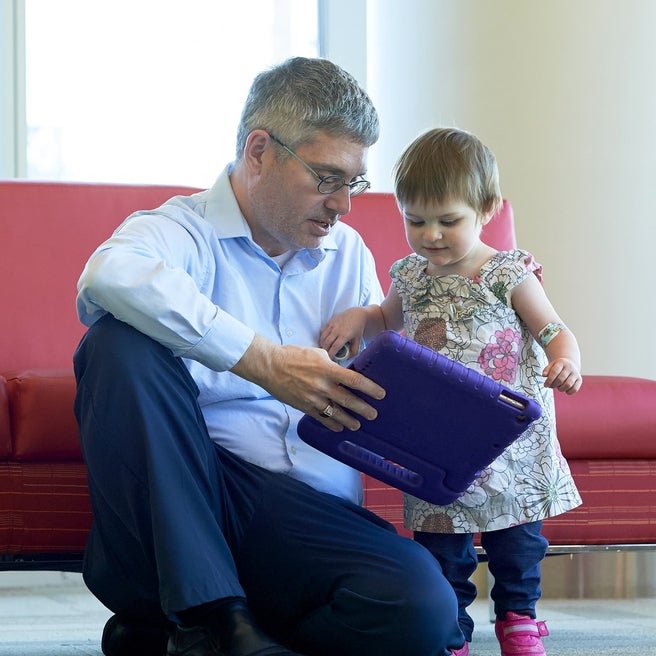What is Autoimmune Lymphoproliferative Syndrome?
Autoimmune lymphoproliferative syndrome, or ALPS, is a rare genetic disorder that affects your child's immune system. With ALPS your child’s immune system has difficulty stopping some types of immune cells from reacting and making copies (proliferating). This disorder can affect both children and adults.
In ALPS, there's a buildup of too many of a certain type of white blood cell, called lymphocytes, in your child’s lymph nodes, liver, and spleen. ALPS can also cause your child to have too few red blood cells (anemia), low numbers of platelets (thrombocytopenia), and a lack of a different type of white blood cell called neutrophils.
Causes of Autoimmune Lymphoproliferative Syndrome
ALPS occurs because of changes (variants) in some special genes that control how lymphocytes are turned off after your child’s body begins an immune response. The most commonly affected gene is called FAS, but there are other genes in your child’s body that can cause something similar. The changes in the gene may happen because of a change that happened in all the cells in your child’s body (germline variant), or the change could be only in the genes in the lymphocytes (somatic variant). Both types of change (germline or somatic) can cause your child’s immune system to remain active even when there is no infection in your child’s body.
Genetic Inheritance of Autoimmune Lymphoproliferative Syndrome
ALPS can be passed from parents to child in one of three ways:
- Autosomal dominant inheritance – If your child receives one copy of the gene with the change from one parent, and one unaffected gene from the other parent, this is called autosomal dominant inheritance. This is how most children inherit ALPS. It is important to note, however, that not all children with changes in the genes that cause ALPS have symptoms. And the symptoms of ALPS can be very irregular.
- Sporadic inheritance or somatic variant - Sometimes, the change in the gene can occur in your child even if you have no family history of the ALPS disorder, and even when a parent is not affected. If the genetic change happens in the egg or sperm at the time of conception, this is called sporadic. Sporadic inheritance can be passed down to the next generation because it is a germline change in the patient with ALPS. All that person’s cells have genetic changes and those changes can be passed on to their children. However, if the genetic change happens later, this is called a somatic variant. A somatic variant only affects the blood cells of the person (specifically, the lymphocytes) and cannot be passed on to future generations.
- Autosomal recessive pattern – In some cases of ALPS caused by changes in other genes besides FAS, each parent can pass down one copy of an altered gene, while showing no active symptoms. You will only have symptoms of this disorder if you have two copies of the changed gene. This is called an autosomal recessive pattern.
Signs and symptoms of Autoimmune Lymphoproliferative Syndrome
The symptoms your child experiences will depend on whether there are large numbers of abnormal lymphocytes or changes in blood cell numbers. If your child has ALPS, you might notice symptoms like:
- Swollen lymph nodes in the neck, armpit, or groin
- A larger than normal spleen
- Tiredness/fatigue
- Dizziness Paleness (from anemia)
- Increased chances of infection (from low neutrophils)
- Nose bleeds, bleeding gums or bruising (from low platelets)
- Mouth ulcers
- Slow wound healing
Other, more rare complications you may notice if your child has ALPS can include:
- Hepatitis - inflammation of the liver
- Glomerulonephritis - inflammation of the kidneys
- Uveitis - inflammation of the iris in the eye
Testing and diagnosis for Autoimmune Lymphoproliferative Syndrome
We know when your child is experiencing unexplained symptoms and illness, you want to find out why and quickly get treatment that works. The Immune Dysregulation Program at Children's Hospital of Philadelphia (CHOP) is your family's go-to resource for advanced diagnosis of immune disorders that affect multiple areas of your child’s body. Our goal is to arrive at a diagnosis and determine a personalized plan to treat your child’s unique symptoms.
Treatment and Follow-up Care for Autoimmune Lymphoproliferative Syndrome
Your child may not require treatment beyond regular monitoring of their lymph node or spleen size and blood cell count. However, more severe cases may require:
- Immunosuppressive medication - Medicine to help control your child’s autoimmune responses and issues like excessive growth of lymphocytes. Most commonly, sirolimus is used to help control low blood counts (autoimmune cytopenias) and large spleen/lymph nodes. This medicine works to block the abnormal pathways that are changed in patients with ALPS. It is highly effective and usually well tolerated, although your child can have side effects. It also requires careful monitoring and follow-up. Some patients may require therapy with more than one medication to control the disease.
- Stem cell transplant - Considered in the rarest cases
Long-term outlook for children with Autoimmune Lymphoproliferative Syndrome
The long-term outlook for most children with ALPS is positive. However, some children with ALPS have an increased risk of developing lymphoma, a cancer of the lymph system. You should monitor your child for symptoms of lymphoma, such as night sweats, fever, fatigue, weight loss, loss of appetite, and sudden lymph node enlargement. Your child should see a doctor right away if they develop any of these symptoms.
Although the risk of developing lymphoma is higher for children with ALPS than children who do not have ALPS, most children affected by ALPS will never develop lymphoma.
